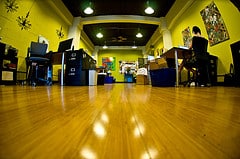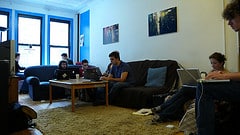Last year, coworking spaces started popping up faster than Starbucks coffee shops. The concept may be new to attorneys, so we thought we’d answer the question: What is coworking?
Coworking is a style of work where professionals, who are not necessarily employed by the same organization, share a physical work environment, and frequently have similar values and professional habits. They are also interested in the benefits that come from working alongside other talented professionals in the same space, including collaborating on projects or exchanging leads and referrals.
As it turns out, solo attorneys and small law firms have been coworking for decades; technically speaking, any shared law office space would be considered coworking. For attorneys, the benefits that come with coworking are typically a steady stream of client referrals and practice advice from experienced colleagues when it is required.
Coworking’s recent transformation from a verb to a noun.
Over the last two years, the concept of coworking has become very popular and the term coworking has morphed into a noun used to describe a type of physical workspace. For the most part, coworking spaces are generally large, airy rooms with a more casual feel than traditional office space. Think ‘Last Supper’ style tables and chairs, clever decor, white board walls, lots of coffee and sometime beer.
In Manhattan, coworking centers have been sprouting up faster than Starbucks. We-work, Hive@55, OfficeLinks, New Work City and the 800 pound gorilla of the shared office space industry, Regus, have all ramped up their co-working offerings.
Professionals can buy day passes to use a coworking center for about $40 per day, or monthly memberships that can range from $200 to $700 per month, with prices being higher for a dedicated workspaces.
 What is the work environment like in a coworking space?
What is the work environment like in a coworking space?
Though you wouldn’t expect them to be, coworking spaces tend to be relatively quiet. Of course, different centers will have different cultures, and with that, different levels of acceptable noise. Individual coworking spaces tend to attract professionals with similar work habits, for example, a programmer heavy center, or a blogger-heavy center.
While the design of each center may differ, they generally have the feel of a library, except more trendy. And like a library, there is social expectation that people will not disturb each other.
This being said, when executed properly, interacting with peers is an integral part of the co-working experience. So, many coworking centers have a separate lounge style areas where members can converse, make phone calls and eat lunch.
What type of professionals use a coworking space?
Coworking spaces are particularly popular with freelancers, like blog writers or webs designers, who would normally work from a home office. It is also very popular with entrepreneurs, start-up companies and small businesses, particularly in technology fields. Also, large companies sometimes provide stipends for remote employees, who choose coworking centers that fit best with their style of work.
However, there has been some recent backlash against coworking by entrepreneurial companies that have complained about it being difficult to build company culture, although the consensus of reviews remain upbeat.
Is coworking a viable option for lawyers?
Multi-professional coworking spaces, like centers operated by We-work or MicroOffice, can be viable for attorneys, particularly those who work primarily from home but want an inexpensive professional workspace to use from time-to-time.
However, for attorneys, the same types of issues that can come up in traditional multi-professional shared office spaces, like those you find in executive suites, tend to be magnified in an open coworking space.
For example, privacy and privilege issues can be problematic, and different professionals’ work habits may conflict with the way law is practiced, potentially making it difficult for an attorney to concentrate, especially when drafting or reviewing complex briefs or contracts.
Notwithstanding, if you are the type of person who can get work done in a coffee shop, then you can certainly get work done your every-day coworking center.
When looking for a coworking space, attorneys would be well-served to find a space where the demographic skews towards the more mature professional than foosball playing techie.
Is a multi-professional coworking space a good environment for lawyers to generate new business?
For B-to-B attorneys, a large coworking space with hundreds of entrepreneurial professionals may seem like a fertile environment to find new clients, especially lawyers with IP or corporate finance practices. And while it may seem that landing clients should be as easy as shooting fish in a barrel, attorneys who have tried this approach have cautioned otherwise.
The feedback we have received from other attorneys has been reasonably consistent: they mostly ended up being solicited for free legal advice, and those entrepreneurs who required legal services were often already represented by counsel.
While it is entirely possible to land clients in a multi-professional coworking space, these attorneys have reported finding better success when they shared office space with other attorneys.



